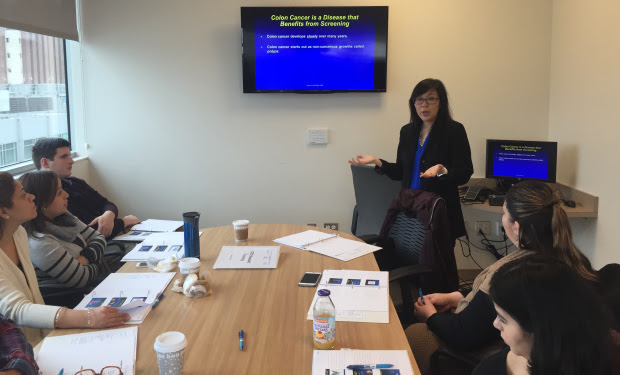CARES Program Aims to Increase Colorectal Cancer Screening
reprinted from Carl West/TBTNewsService.com
Published: March 30, 2016

Karen Kim, MD, professor of medicine answers a few questions about the CARES program
|
Karen Kim: The goal of Cook County CARES is to improve colorectal cancer screening. Although efforts have been in place to improve colorectal cancer screening, the lack of coordination across different entities diminishes the impact of such efforts. Our organized approach to colorectal cancer screening partners the University of Chicago with community health clinics, public health departments, and insurers.
Through the CARES program, we hope to 1) raise public awareness and knowledge of colorectal cancer prevention; 2) use health information technology to promote colorectal cancer screening among individuals who are between the age of 50 and 75 years; 3) improve adherence to quality colorectal cancer screening and rescreening; 4) integrate population-level and clinical data to improve surveillance for colorectal cancer control and prevention ; and 5) coordinate resources to create a robust colorectal cancer control and prevention safety net.
Why is colorectal cancer screening important, and why are there disparities in screening in some Chicago communities?
Karen Kim: Colorectal cancer is the second leading cause of cancer-related deaths in the U.S. When men and women are combined, yet it can be prevented or detected at an early stage through screening. Colorectal cancer disparities are particularly disturbing. Among African Americans, death from colorectal cancer is twice that of other populations, while screening rates are lowest among Asian Americans. Cook County CARES aims to address these disparities through education and targeted screening.
What community organizations are you working with, and how will you work together to achieve the program’s goals?
Karen Kim: Cook County CARES is housed within the University of Chicago Medicine’s Center for Asian Health Equity and collaborates with three Federally Qualified Health Centers (FQHCs): Mile Square Health Center, Heartland Heath Centers, and Asian Human Services Family Health Center. Each health system partner offers a unique perspective, and reflects the diversity of the city. Together, we have developed a specific implementation strategy for each individual health system partner and their individual clinic sites.
What data are you collecting and what do you hope it will reveal?
Karen Kim: Our health systems and partners provided a year’s worth of baseline colorectal cancer screening data, allowing for an accurate colorectal cancer screening baseline rate as a starting point. Regular collection, analysis, and monitoring of colorectal cancer screening rates with our partner health systems will help us understand how our efforts are affecting colorectal cancer screening rates.
The Cook County CARES is laying the groundwork to form a Colorectal Coalition of Partnerships (CCOP) that will allow messaging to patients and providers as well as training and strategies for process change for providers and health systems beyond the Cook County area. In year two, we plan to invite collaborators from across the state to join our discussion and share in training and dissemination activities. Finally, one of the goals is to develop a model program to provide equal access to screening and follow-up care for underserved and disadvantaged communities.